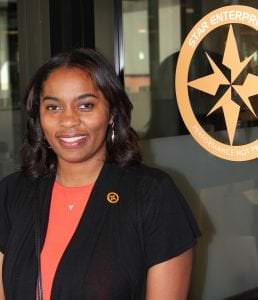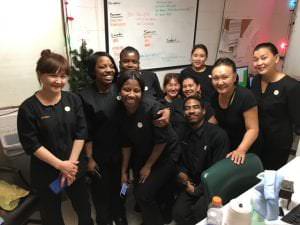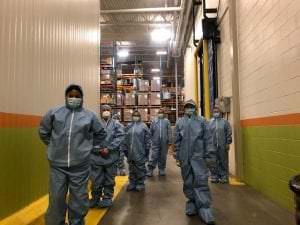Premier Access: Up to 2 Months Free at Select Locations. Learn More
Carr Workplaces
Partner Stories: STAR Enterprises
May 8th, 2020 
STAR Enterprises Is Ensuring the Safety of Its Clients by Cleaning & Disinfecting Shared Spaces for Our Safe Return Following COVID-19
As COVID-19 continues to alter our way of life, it is of the upmost importance that we find time to pause, take a moment of reflection, and recognize those who are continually devoting hours of their time in the fight against COVID-19. To those serving on the front lines – who are risking their lives, to save the lives of the others – we say thank you. To those acting as a beacon of hope and providing sustained optimism for others in their communities, we say thank you. And to the many who are helping those directly impacted by COVID-19 through donations of any sort, we say thank you.
Rather than focusing on a client, this week’s edition highlights STAR Enterprises, a partner of Carr Workplaces. STAR is regarded in the DC metro area as a provider of quality staffing, janitorial, and training solutions to commercial hospitality and government entities (About – STAR Enterprises). In the fight against COVID-19, STAR is working diligently to keep its client’s workspaces clean, sanitized, and safe to return to, as stay-at-home orders are lifted throughout the coming weeks.
 “You want me to give you our secret sauce?” jokes Naomi Brown – Chief Executive Officer of STAR Enterprises – as I ask her to explain the what the difference between cleaning and disinfecting is.
“You want me to give you our secret sauce?” jokes Naomi Brown – Chief Executive Officer of STAR Enterprises – as I ask her to explain the what the difference between cleaning and disinfecting is.
“Cleaning is more about getting rid of dirt and mess versus disinfection is killing germs and viruses,” she says.
“STAR Enterprises, as a practice, often sanitizes and disinfects. It’s a part of what we do for a majority of the services that we provide that are involved in the cleaning realm.”
100% woman and minority-owned, STAR strives not just to provide great service to its clients, but to create a great workplace environment for its employees, and to generate positive waves within its community.
This sense of positivity reverberated through the words of Naomi Brown as she explained how she came to STAR Enterprises.
“Interestingly enough, ten years ago, it was a time in history where we were moving and people weren’t quite sure what to do, what to spend, and just with my background, I wanted to be involved in something that was indispensable,” she explained.
“That’s how I got into the hospitality industry – as much as technology was evolving, guess what? Robots can’t do everything,” she said with a chuckle.
Through talking with Naomi, it became apparent to me just how proud she was of the culture that had been instilled at STAR.
“This type of work – albeit not sexy – you can still have a lot of pride in what your end product is and what you’re producing.”
Given the spread of COVID-19, STAR is continually upholding the high standards that it has held for years, but Naomi doesn’t just want to stop there.

These new conditions have dictated that STAR aim to provide its Clients with an increased amount of transparency and communication as individuals begin to return to their workspaces.
“We’ve always been focused on quality and trying to go the extra mile. From a training perspective, really the only modification is reminding our staff of people’s anxiety towards cleanliness.”
“They have to make sure that they’re aware of our customers and explaining more what we are doing. Our staff communicates with clients to let them know that we got this, we have a procedure in place for this. We just want to make sure that we give people that extra level of comfort.”
Naomi made sure to emphasize that although STAR aims to provide exemplary service, it ultimately comes down to those occupying our shared spaces, to stop the spread of COVID-19 and create that clean, comfortable, and sanitary environment.
She posed the question of, “When we go into a shared workspace or environment, how do you mitigate risk?”
“Those practices to minimize that risk, start at home,” she explained. “Don’t be social distancing and doing all of the things that you need to be doing at work, and then on your route home or when you get home, violate that. That then brings something back into the ecosystem.”

These new precautions that we will have to take as we return to life in shared spaces implies that there will likely be a new norm in shared space culture – an unprecedented norm that we will have to gradually adjust to.
But what exactly does the new normal look like, you wonder.
“The new normal,” repeated Naomi, as she let out a brief sigh and paused to collect her thoughts.
“I think that we have all of these kind of alarms on our phones that tell us to [wake up], stand up, stretch, and drink some water and do all of these things,” she said. “We also need to think about setting cleaning alarms for ourselves because, in your personal space – or when you transition from one space to another – there are things that you need to be cognizant of.”
“I focus highly on individuals because companies are trying to reach out, trying to set policies, and trying to have masks, gloves, and Lysol in place for people to utilize and to create barriers. That’s great but it’s no good if people are cross-contaminating or not washing their hands.”
I sat back in my desk chair, absorbing the weight of what Naomi was saying – trying to understand an environment where my cell phone alarm reminds me to wash my hands, to not touch my face, and to be conscientious of those around me. It may sound crazy, but it’s necessary.
“This is one of those things that is definitely about frequency. Your goal and your focus is to get your job done, so, it’s a whole ‘nother job to practice proper hygiene in this current environment but I think we can do it,” Naomi said.
“I think people are up to the task, they just need a little help. Don’t look at it as a crutch or a bad thing if you have an alarm or if you have a certain time in your day that you know you need to do certain things.”
As somewhat of a clean freak myself, what Naomi said next really struck a chord with me.
“It’s really about these things being essential and changing our mindset that they are and that it’s not just like, ‘Oh, they’re extra, like I’m already a clean person.’”
She asked me, “We all have somebody in our family is who a clean freak, right?” – “Well, yes, I’m the clean freak in my family,” I replied.
“There are clean freaks that are getting this virus,” she then said. “I think a lot of people feel that because they’re neat or that because they have certain practices in their lives, that it’s just how they dictate their life but we’re all very connected.”
This gave me a broad understanding that how human connectivity is fostered, will likely be a central focus of this new norm – understanding how monitoring our actions while interacting with others can create a safer public environment.
“I think that it’s about balancing the cleaning needs of yourself with the cleaning needs of the community,” Naomi added.
While understanding and practicing proper hygiene seems simple in theory, Naomi made sure to provide me with four tangible steps that can help create a safer atmosphere for all as we return to work.
First, “I think it is hand hygiene – you can’t say enough about washing your hands,” she said.
Second, “I think it is, being conscious of touch points, which are door handles, those types of things.”
Third, “Respect,” Naomi exclaimed, “because what my six feet is, versus what your six feet is likely different.”
And fourth – and what I felt will become most pertinent in stopping the spread of COVID-19 – “Your attitude,” Naomi said. “Some things are not as offensive to others. What I constitute as super clean or careful as a policy, may not be what you do.”
“Take these steps for yourself, which is hand hygiene, being conscious of touch points, respecting each other’s space and then having a good attitude,” Naomi reiterated.
“Practice these things from start to finish, from home to work. Don’t just practice these things at work, carry them through to your home.”
With these crucial four steps in mind, Naomi left me with these valuable words of wisdom:
“This is about your life and about being really cautious – but not scared – just prepared. That’s one of the things that we are telling people, you don’t need to be scared, just be prepared.”